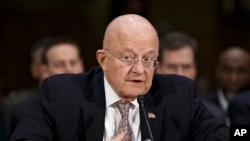The top U.S. intelligence official says the Islamic State’s penchant for publicizing beheadings and other brutal forms of punishment is hurting the terror group’s bottom line.
“These brutalities, publicized brutalities by ISIL - beheading and immolations and the like - have really had a galvanizing effect even in the Mideast,” U.S. Director of National Intelligence James Clapper said at an appearance Monday at the Council on Foreign Relations in New York .
Clapper said intelligence officials have seen a “big decline” in donations to the Islamic State, saying donations were reduced to “less than one percent of their total revenue from last year.”
He said some of the decline in donations to IS was also due to increased oversight from governments, especially in the Middle East, sometimes with help from the United States.
U.S. officials have said previously most of the Islamic State’s money has come from robbery and extortion, oil sales and ransom payments for kidnapping victims. But just last month, a top U.S. Treasury official said Washington had been having “some important successes” in denying the Islamic State access to revenue and in limiting its ability to use the money it did have.
Profits from selling oil on the black market, once estimated to net IS several million dollars per week, has been especially hurt by targeted airstrikes by U.S. and coalition warplanes, the officials said.
Still, Clapper said the effort to defeat the Islamic State still faces numerous challenges, none more difficult than finding ways to counter the group’s narrative in the Muslim world, “given the general lack of popularity of the United States in many of these countries.”
“In the end, our ability to do that and to really influence change in attitudes and change in worldview is only going to come about when the people there, themselves, do that,” he said.
Clapper also noted difficulties in countering the Islamic State in Syria, which he said is “compounded by the fact that we're [the U.S.] actually not there."




